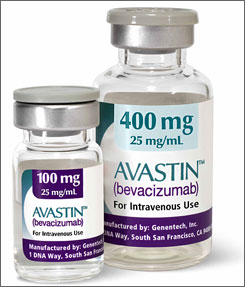
Basel - Swiss pharma major Roche Holding AG said a new study has revealed that adding cancer drug Avastin to radiation and chemotherapy significantly reduce the progression of an aggressive form of brain cancer.
In a statement Friday, Basel headquartered company, which has focuses on cancer drugs, said its Phase III AVAglio study met one of its main targets of improving progression-free survival in people with glioblastoma compared to those treated with radiation and temozolomide chemotherapy plus placebo.
"This study showed that people with glioblastoma, a particularly devastating and aggressive cancer without many treatment options, lived significantly longer without their disease worsening when Avastin was added to radiation and temozolomide chemotherapy," said Hal Barron M.D.,
Chief Medical Officer and Head Global Product Development.
Glioma (cancer of the glial cells) is the most common type of malignant primary brain tumour (a tumour that originates in the brain), accounting for approximately one third of all cases diagnosed.
Glioblastoma (or glioblastoma multiforme) is the most common and the most aggressive type of glioma which affects approximately 13,000 people per year in the EU.
Data for final overall survival, the study's other main endpoint, is expected in 2013, the company said.
No new safety findings were observed in the study and the adverse events were consistent with those seen in previous trials of Avastin across tumor types for approved indications, the company stated.
Last year Avastin sales were hit when the United States revoked its conditional approval as a treatment for breast cancer.
Roche's other cancer drugs Rituxan and Herceptin, instead saw sales growth accelerate to 9 per cent and 11 per cent respectively in the first half.
Avastin is currently approved in the United States and over 30 countries worldwide for the treatment of glioblastoma as a single agent and in some countries in combination with irinotecan for adult patients with progressive disease following prior therapy (relapsed setting).
The approval in the US was granted under the Food and Drug Administration's (FDA) accelerated approval programme.
Roche plans to discuss these phase III results with global regulatory authorities, including the European Medicines Agency (EMA) and the U.S. Food and Drug Administration (FDA).
With the initial approval in the USA for advanced colorectal cancer in 2004, Avastin became the first anti-angiogenic therapy made widely available for the treatment of patients with an advanced cancer.
Avastin is currently used for treatment across several types of cancer. In Europe it is approved for the treatment of advanced stages of breast cancer, colorectal cancer, non-small cell lung cancer, kidney cancer and ovarian cancer, and is available in the USA for the treatment of colorectal cancer, non-small cell lung cancer and kidney cancer.
In addition, Avastin is approved in the USA and over 30 other countries for the treatment of patients with progressive glioblastoma following prior therapy. Avastin is approved in Japan for the treatment of the advanced stages of colorectal, non-small cell lung cancer and breast cancer.
In a statement Friday, Basel headquartered company, which has focuses on cancer drugs, said its Phase III AVAglio study met one of its main targets of improving progression-free survival in people with glioblastoma compared to those treated with radiation and temozolomide chemotherapy plus placebo.
"This study showed that people with glioblastoma, a particularly devastating and aggressive cancer without many treatment options, lived significantly longer without their disease worsening when Avastin was added to radiation and temozolomide chemotherapy," said Hal Barron M.D.,
Chief Medical Officer and Head Global Product Development.
Glioma (cancer of the glial cells) is the most common type of malignant primary brain tumour (a tumour that originates in the brain), accounting for approximately one third of all cases diagnosed.
Glioblastoma (or glioblastoma multiforme) is the most common and the most aggressive type of glioma which affects approximately 13,000 people per year in the EU.
Data for final overall survival, the study's other main endpoint, is expected in 2013, the company said.
No new safety findings were observed in the study and the adverse events were consistent with those seen in previous trials of Avastin across tumor types for approved indications, the company stated.
Last year Avastin sales were hit when the United States revoked its conditional approval as a treatment for breast cancer.
Roche's other cancer drugs Rituxan and Herceptin, instead saw sales growth accelerate to 9 per cent and 11 per cent respectively in the first half.
Avastin is currently approved in the United States and over 30 countries worldwide for the treatment of glioblastoma as a single agent and in some countries in combination with irinotecan for adult patients with progressive disease following prior therapy (relapsed setting).
The approval in the US was granted under the Food and Drug Administration's (FDA) accelerated approval programme.
Roche plans to discuss these phase III results with global regulatory authorities, including the European Medicines Agency (EMA) and the U.S. Food and Drug Administration (FDA).
With the initial approval in the USA for advanced colorectal cancer in 2004, Avastin became the first anti-angiogenic therapy made widely available for the treatment of patients with an advanced cancer.
Avastin is currently used for treatment across several types of cancer. In Europe it is approved for the treatment of advanced stages of breast cancer, colorectal cancer, non-small cell lung cancer, kidney cancer and ovarian cancer, and is available in the USA for the treatment of colorectal cancer, non-small cell lung cancer and kidney cancer.
In addition, Avastin is approved in the USA and over 30 other countries for the treatment of patients with progressive glioblastoma following prior therapy. Avastin is approved in Japan for the treatment of the advanced stages of colorectal, non-small cell lung cancer and breast cancer.